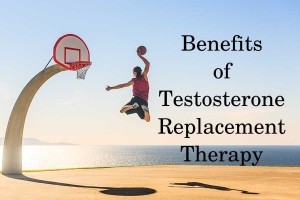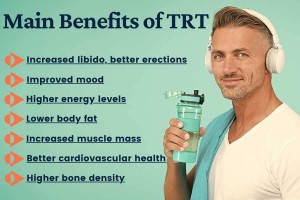In this article

If you have low testosterone, your doctor will likely prescribe testosterone replacement therapy (TRT) as the quickest, safest, and most efficient way to address your symptoms. TRT is a form of treatment that involves taking exogenous testosterone to restore your hormonal balance.
But like any other treatment, TRT has potential risks that can be eliminated with proper medical supervision. That’s why the best way to receive safe and effective therapy is to take legally prescribed testosterone.
Main benefits of testosterone therapy for men
The main goal of TRT is to restore your testosterone levels back to the normal physiological ranges for men.
The treatment works by administering testosterone ester in your body, which is metabolized into testosterone that is indistinguishable from the one normally produced in the testes.
Restoring your testosterone balance via TRT can have the following benefits:
- Increased libido and better erections
- Improved mood
- Higher energy levels
- Lower body fat
- Increased muscle mass
- Better cardiovascular health
- Higher bone density
Testosterone can be administered via different routes, including injections, gels, patches, implants, and pills. How long it will take to feel the effects of TRT will depend on your dose and the form of testosterone.
Testosterone injections act faster than other forms of TRT, as they can help raise your serum T levels back to the reference ranges as soon as 36 hours after the first injection.
Doctors prefer testosterone injections as the best form of TRT for new patients, as they allow for much more precise dosing and titration. Also, most patients prefer injections over other forms due to their affordability and quick effectiveness.
53% of patients prefer injectable TRT
The first benefits occur within the first 3 weeks of therapy and include increased libido, morning erections, and sexual satisfaction. It usually takes 2-3 months until you notice most of the effects of TRT and 6-12 months until they reach a maximum.
1. Improves sexual health
According to research, at least small amounts of testosterone are essential for normal erections. TRT can help improve erections in patients with erectile dysfunction due to extremely low T.
Testosterone injections can also help erections and sexual performance by increasing libido. A higher sex drive will also help with sexual satisfaction and morning erections. In addition, TRT may help increase the time men last during sex in some types of premature ejaculation.
Testosterone is also essential for the normal growth and development of the male genitalia during childhood and puberty, but it does not affect the penis size in adults.
Improved sexual health is often the first group of benefits experienced by patients on TRT, including increased erections, libido, and sexual satisfaction
2. Improves mood and QOL
Testosterone injections can have significant benefits for mood in men with low T, mediated by the effects of testosterone on various neurotransmitters and their receptors, including serotonin, dopamine, and gamma-aminobutyric acid (GABA).
According to a recent meta-analysis that included data from 1890 men, TRT is associated with a significant reduction of depressive symptoms. Testosterone therapy benefits on mood and depression usually occur within 2 months of treatment and reach their maximum within 4-8 months.
In addition, TRT will likely improve other aspects of your quality of life, such as energy levels and cognitive functions. Improved energy levels are the most frequently reported benefit (52.4%), followed by improved concentration, well-being, and mental clarity.
TRT can dramatically improve symptoms of depression amongst men with low T and provide benefits for energy levels, cognition, focus, and overall well-being
3. Improves body composition
Testosterone injections induce a dramatic shift in body composition in men with low T. That’s because of the potent anabolic effects of the hormone towards muscle tissue while at the same time stimulating metabolism in adipose tissue.
Both effects are mediated by the activation of the androgen receptor, which is found in the nuclei of most cells.
Therefore, testosterone increases muscle growth by stimulating protein synthesis in the nuclei of muscle cells. The process dramatically surpasses protein breakdown and leads to an increase in muscle mass.
TRT is also associated with a boost in metabolism, and the increase can reach up to 10%, according to research.
In addition, triggering these receptors in adipose tissue leads to the release of fat from adipose cells and its subsequent oxidation.
TRT injections may also affect body fat distribution and reduce visceral fat. Visceral fat accumulates around the waist and internal organs. When it’s in excess, the condition is called visceral beauty and it’s a risk factor for insulin resistance, type 2 diabetes, and heart disease.
Testosterone therapy stimulates muscle protein synthesis and fat breakdown simultaneously, which leads to a favorable shift in body composition in men
3.1. Increases lean body mass
Testosterone injections can help increase muscle strength and size in elderly individuals while countering the age-related decline in lean body mass, known as sarcopenia.
Testosterone can help increase muscle strength, endurance and overall physical performance
4. Improves bone density
The benefits of TRT on bone tissue usually occur last during the course of the treatment. Injections increase bone mineral density after 6 months on average, and the benefits reach their maximum after 3 years of TRT.
According to trials, testosterone injections can successfully reverse and treat osteopenia and osteoporosis in men with low T. Testosterone also helps decrease calcium excretion, which has a beneficial effect on calcium retention in the body.
TRT has anabolic effects on bone tissue, which helps increase bone mineral density, reverse osteopenia and prevent osteoporosis in men with low T
5. Lowers “bad cholesterol” and better heart health
Testosterone therapy can also affect your cholesterol metabolism and heart health. TRT leads to a significant decrease in total cholesterol levels, according to most randomized clinical studies.
One of the trials also showed a reduction of LDL, also known as the “bad cholesterol”, and high LDL levels are associated with heart disease. On the other hand, the research on “good cholesterol” (HDL) is conflicting, as some studies report an increase while others report a decrease in HDL levels.
Testosterone injections have also been shown to improve cardiovascular function in various heart conditions such as heart failure.
Low T can also have a negative effect on cardiovascular health and increase the risk of heart attacks and strokes. Yet, the American Urological Association reports that the evidence so far is conflicting on whether TRT decreases the risk of heart disease in men with low T.
TRT can exert a favorable effect on cholesterol levels in men with low T and may decrease the risk of heart disease in these patients
Do the benefits of TRT outweigh the side effects?
TRT is generally well tolerated by most patients with low T, but some side effects are possible, and their occurrence depends on the dose, presence of comorbidities, and individual sensitivity.

TRT will also suppress the production of sperm if the patient still has functional testes. If you wish to remain fertile, make sure to notify your doctor before starting TRT.
Fertility can be preserved in men with low T due to secondary hypogonadism by combining testosterone injections with other medications that stimulate the function of the testes, such as human choriogonadotropin (hCG).
Despite the increase in red blood cells, official guidelines report no definitive evidence linking TRT to increased risk of thrombi or heart disease.
TRT can also cause an enlargement of the prostate gland, but the size will mainly correspond to the person’s age and will not exceed the physiological norms. There is no evidence linking TRT to an increased risk of prostate cancer.
With that being said, men with prostate hyperplasia, prostate cancer, or recent cardiovascular incidents are not suitable for TRT.
Currently, scientists have not estimated the optimal duration for TRT in men with low T. Long term trials lasting for up to 11 years report that TRT may lower mortality in men with low T compared to placebo.
Yet, every patient may respond differently to the treatment, so your doctor will be the one to estimate the best duration of TRT for managing your condition. The exact length of your therapy will depend mainly on its effectiveness and tolerance.
In men with low T and without contraindications, the benefits of TRT will significantly outweigh the risks, as leaving hypogonadism untreated is associated with increased mortality and decreased quality of life. Here is a short comparison between the most common benefits and risks of TRT:
Are other forms of testosterone treatment just as effective?
Testosterone boosters and supplements labeled as natural alternatives to medical treatment cannot affect testosterone production in men with low T due to hypogonadism.
Most of them contain various herbal extracts and amino acids whose effectiveness is not supported by the scientific literature.
Besides, the scientists warn that about 10% of the most common ingredients in testosterone boosters may have the opposite effects and decrease natural T production.
Lifestyle changes may have a more favorable effect and lead to a small increase in testosterone if your serum T levels are already within the healthy reference ranges. Such changes include:
- weight loss (if overweight or obese)
- healthy and balanced diet
- regular exercise
- improved sleep
- avoiding smoking and alcohol use
Yet, no lifestyle change or natural remedy can help restore hormonal levels in men with low T. Therefore, testosterone injections is the only effective method for managing the symptoms of hypogonadism.
If you are concerned about the safety of testosterone injections and you’d like to know whether you need TRT and how you may avoid the risks. Get answers to all your questions from our team of medical doctors.
Our specialists can offer free consultation, prescription, and constant medical supervision during your treatment to maximize the benefits while altogether avoiding any risks of TRT.

